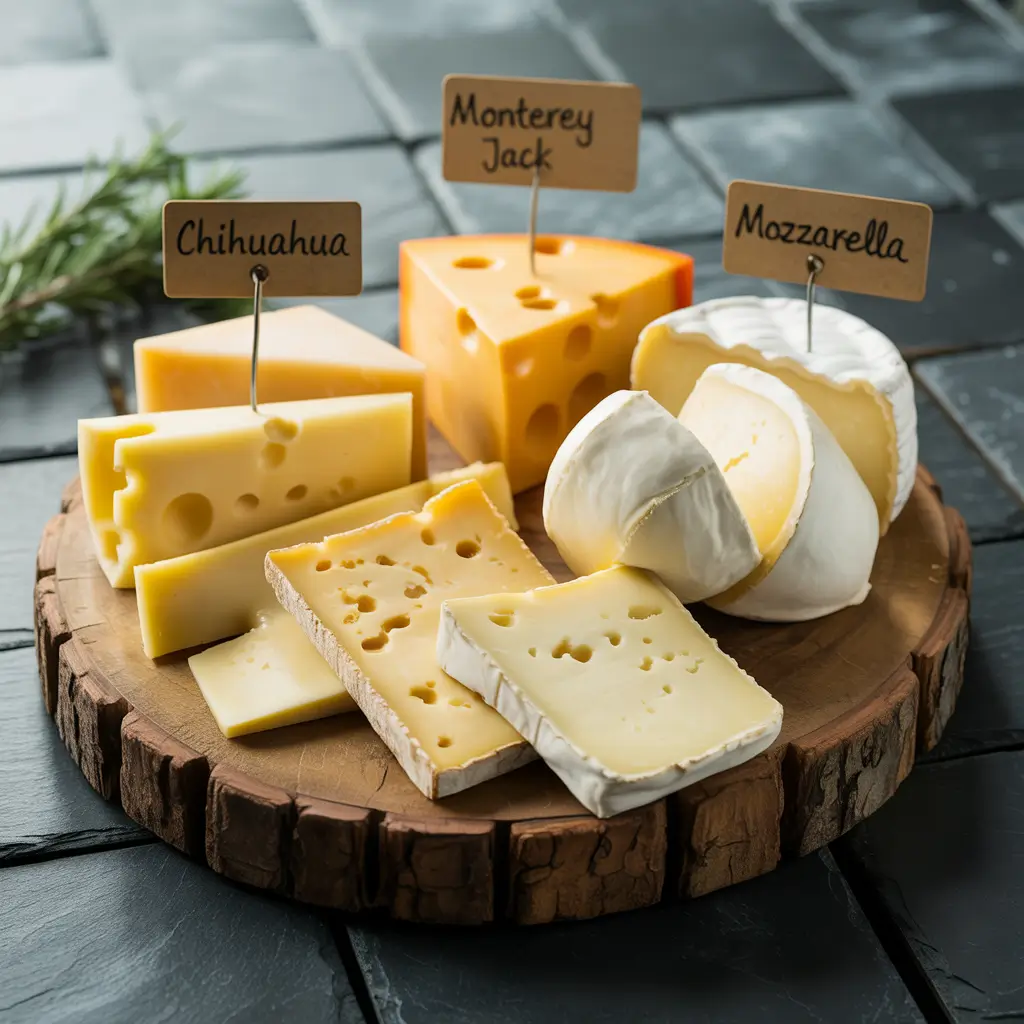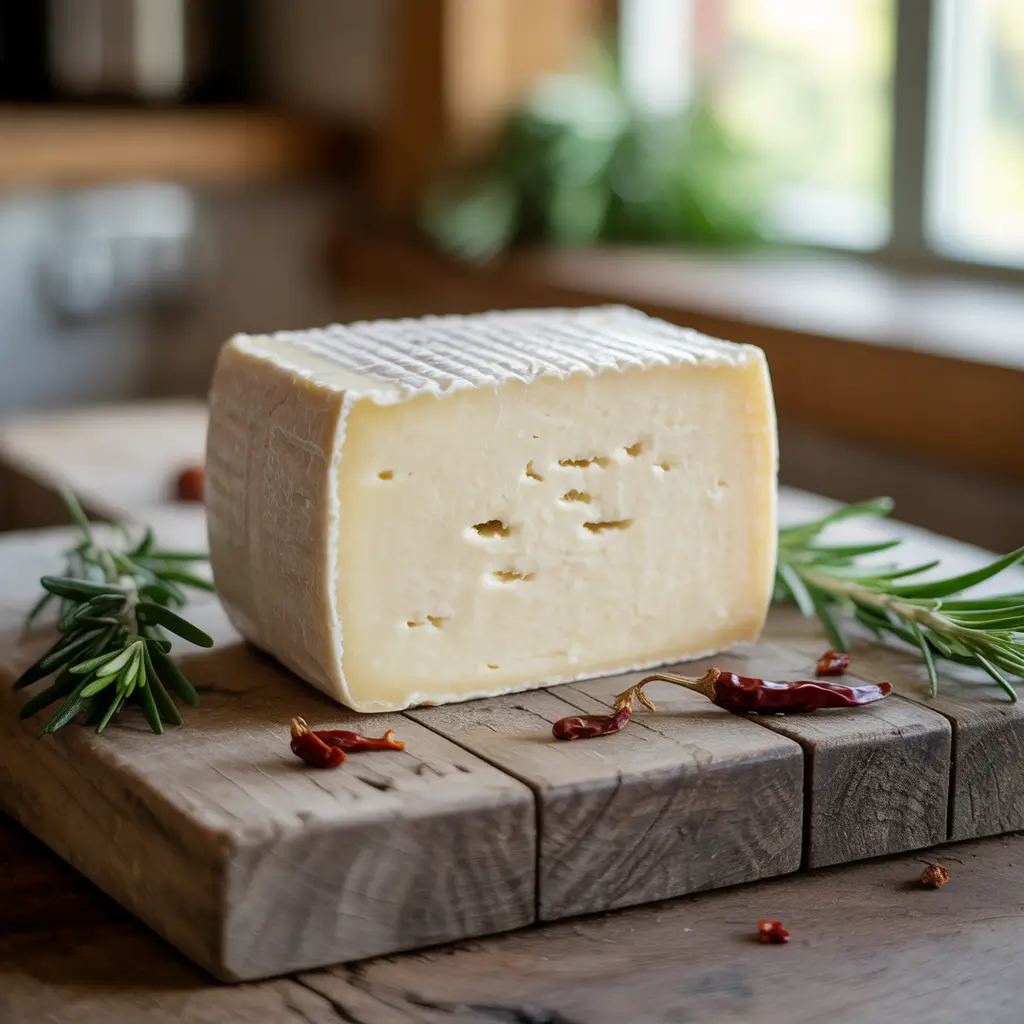introduction
Chihuahua cheese is an underrated delight in Mexican cuisine, loved for its creamy consistency and subtly rich flavor. Originally crafted by Mennonite settlers in northern Mexico, this cheese has carved a place for itself in both traditional and modern recipes. Its exceptional melting ability makes it a top choice for comforting favorites like quesadillas, cheesy nachos, and gourmet-style burgers.
What makes Chihuahua cheese truly special is its blend of cultural heritage and culinary adaptability. As more home cooks in the U.S. explore authentic Mexican flavors, this cheese is quickly gaining recognition for its taste and versatility. Whether you’re interested in discovering how it’s produced, where to purchase quality options, or which recipes highlight its flavor best—you’re in the right place.
In this guide, you’ll find everything from brand insights like Supremo, to nutritional information and expert storage tips. And if you’re in the mood for a cozy pairing, don’t miss our Dutch oven bread recipe—it’s the perfect match for melted Chihuahua cheese..Check out our Dutch oven artisan bread recipe to pair with melted Chihuahua cheese for an unforgettable combo.
table of content
Table of Contents
What Is Chihuahua Cheese? The Ultimate Guide to Mexico’s Melty Delight
Discover the creamy, melty magic of Chihuahua cheese—Mexico’s underrated culinary gem. Learn about its Mennonite roots, melting perfection, and delicious pairings.
- Prep Time: 10 minutes
- Cook Time: 15 minutes
- Total Time: 25 minutes
- Yield: 4 servings
- Category: Cheese Guide
- Method: Melting / Baking
- Cuisine: Mexican
Ingredients
- Authentic Chihuahua cheese (block or shredded)
- Tortillas for quesadillas
- Fresh or pickled jalapeños (optional)
- Chopped onions or herbs
- Preferred dishes: nachos, enchiladas, tacos
- Substitute cheeses: Monterey Jack, Mozzarella, Muenster
Instructions
- Select quality Chihuahua cheese from trusted brands like V&V Supremo® or Cacique®.
- Store cheese at 34°F–40°F wrapped in wax paper and an airtight container.
- Shred or slice cheese for your intended dish.
- Melt cheese over tortillas, baked casseroles, or inside chiles rellenos.
- Pair with crusty bread, apples, and light beverages like Mexican lagers or agua fresca.
- Explore substitutions only when necessary, and aim for similar melt qualities.
Notes
For best flavor and performance, look for labels that say ‘authentic Mennonite style’ or ‘made in Chihuahua.’ Avoid over-melting to retain smooth texture.
Origin and Cultural History of Chihuahua Cheese
The roots of Chihuahua cheese in Northern Mexico
Chihuahua cheese finds its roots in the arid highlands of northern Mexico, specifically in the state of Chihuahua. This region is not only known for its dramatic landscapes but also for producing one of the country’s most beloved cheeses. The cheese gets its name from its geographical origin and has become a signature ingredient in northern Mexican dishes.
The story of Chihuahua cheese is deeply tied to cultural migration. It wasn’t originally a native Mexican cheese—instead, it was introduced by Mennonite settlers who arrived in Chihuahua from Europe in the 1920s. These communities brought their dairy farming expertise and cheesemaking traditions, which soon adapted to local conditions and milk sources, giving birth to what is now known as queso Chihuahua.
How Mennonite communities shaped Chihuahua cheese tradition
Mennonites were instrumental in the cheese’s development. They created a version of cheese similar to European semi-soft varieties, like Havarti and Colby, using pasteurized cow’s milk. Over time, this cheese took on unique characteristics due to Mexico’s climate, soil, and diet of grazing cattle. Today, large Mennonite dairies in Chihuahua are still responsible for much of the country’s authentic production.
These communities placed a strong emphasis on quality, handcrafting cheese with precision and care. The result was a product that earned a reputation not only within Mexico but beyond its borders. Thanks to their meticulous processes and generational expertise, Mennonite Chihuahua cheese remains one of the most consistent and respected forms of artisan cheese available in the region.
Looking for inspiration? Try our guide to spotting authentic soy milk packaging and see how tradition shapes quality across food categories
What Type of Cheese Is Chihuahua Cheese?

Is queso Chihuahua a hard or soft cheese?
Queso Chihuahua is best classified as a semi-soft cheese. It’s firm enough to grate or slice, yet soft enough to melt beautifully under heat. This balance makes it highly versatile in cooking—ideal for everything from gooey quesadillas to oven-baked casseroles.
Unlike crumbly cheeses like queso fresco or aged ones like Cotija, Chihuahua cheese has a supple, creamy body. It’s typically pale yellow or off-white and often comes in blocks or wheels. The texture may remind you of mild cheddar or Colby but with a smoother, more elastic consistency when melted. That’s why it’s often labeled as a “melting cheese” in grocery aisles across the U.S.
How it compares to Monterey Jack and mozzarella
Chihuahua cheese often draws comparisons to Monterey Jack and mozzarella, especially in the kitchen. All three are prized for their meltability, but there are key differences:
| Cheese Type | Flavor Profile | Melting Behavior | Origin |
|---|---|---|---|
| Chihuahua Cheese | Mild, buttery, slightly tangy | Smooth, elastic, gooey | Mexico (Chihuahua) |
| Monterey Jack | Mild, slightly sweet | Soft melt, less stringy | USA (California) |
| Mozzarella | Milky, fresh | Stretchy, stringy | Italy |
While mozzarella is more neutral and stringy, Chihuahua cheese offers a deeper, dairy-forward flavor. Monterey Jack, although similar in taste, doesn’t stretch quite as well and can turn oily when overheated. That’s why Chihuahua cheese is often preferred for dishes that require both a rich taste and melting integrity.
In Tex-Mex cooking, it’s not uncommon to see blends of Chihuahua and mozzarella to get the best of both worlds: stretch from mozzarella and flavor from Chihuahua. Check out our high-protein dip idea using cottage cheese for another smooth and scoopable delight.
How Chihuahua Cheese Is Made
Traditional cheesemaking methods
The original Chihuahua cheese was born from age-old techniques introduced by Mennonite settlers in northern Mexico. These cheesemakers relied on raw cow’s milk, often sourced from grass-fed cows, to produce cheese that was both wholesome and rich in flavor. The process started with gently warming the milk before adding natural rennet to form curds. Once the curds separated, they were cut, stirred, and drained to remove excess whey.
Next came pressing the curds into molds, followed by brining to enhance flavor and preservation. The cheese was then aged for several weeks under cool, humid conditions to develop its mild, buttery character and slightly tangy edge. This handcrafted, small-batch approach resulted in a cheese prized not just for taste, but also for its artisanal authenticity.
Modern industrial production process
Today, large-scale dairies have adapted these traditional practices into more streamlined, hygienic methods. Industrially produced Chihuahua cheese usually uses pasteurized milk, automated rennet addition, and temperature-controlled environments for consistency and food safety.
While machines handle much of the curd-cutting and molding, many producers still honor the original Mennonite recipe, using low-temperature pasteurization and slow aging to preserve flavor. Some brands add a bacterial culture to speed up the aging process while maintaining the smooth, elastic texture that makes Chihuahua cheese so desirable.
This balance of tradition and technology ensures wide availability without sacrificing quality. For the best experience, look for labels that specify “authentic Mennonite style” or “made in Chihuahua,” which often signifies adherence to the original methods.
Discover great ideas like our boiled onion gravy recipe to pair with melted Chihuahua cheese over roasted vegetables or potatoes.
Chihuahua Cheese Taste and Texture
Flavor profile of Chihuahua cheese
The flavor of Chihuahua cheese is often described as mild, buttery, and slightly tangy, making it one of the most approachable cheeses for everyday cooking. It carries a delicate dairy richness that enhances a dish without overpowering it. When fresh, it offers subtle nutty notes, but when aged slightly longer, it develops a more complex depth—think of a balance between creamy cheddar and mellow gouda.
Unlike sharper cheeses, it doesn’t bite or sting the palate. Instead, Chihuahua cheese has a smooth, gentle taste that pairs well with both bold and mild ingredients. This is why it’s a favorite in Tex-Mex meals, classic quesadillas, and even as a standalone table cheese.
Its flavor also makes it an excellent option for children, picky eaters, or anyone who prefers a light taste without sacrificing the savory experience that cheese brings to a dish.
Meltability and cooking performance
What truly sets Chihuahua cheese apart is its incredible meltability. It melts smoothly and evenly without becoming greasy or separating, which is a common problem with other cheeses under high heat. When melted, it forms an elastic, gooey layer that’s perfect for stretchy quesadillas, bubbling enchiladas, and creamy cheese sauces.
Here’s a quick snapshot of how Chihuahua cheese performs in the kitchen:
| Cooking Style | Result With Chihuahua Cheese |
|---|---|
| Grilled or Baked | Melts evenly, golden top |
| Pan-Fried | Crisps on edges, gooey center |
| Oven-Roasted | Great in casseroles and stuffed dishes |
| Sauces & Fondues | Smooth and lump-free |
Its high fat content and moisture level contribute to this melting excellence. Unlike mozzarella, which can become stringy, or cheddar, which may break and oil out, Chihuahua cheese stays cohesive, making it a go-to for both rustic recipes and modern fusion dishes.
Don’t miss our Dutch oven artisan bread—a perfect match for a melty Chihuahua cheese pull-apart loaf or savory grilled toast.Discover melty cheese ideas on HighTasty for more recipe inspiration that stretches flavor and creativity.
Supremo Chihuahua tripe: What Makes It Different?
Brand overview: Supremo and V&V Supremo® history
When you see Supremo Chihuahua tripe in stores, you’re looking at a product from V&V Supremo® Foods, a well-established, family-owned company founded in 1964 by Mexican immigrants in Chicago. Their mission has always been to bring authentic Mexican flavor to American homes, and they’ve done just that with their line of premium dairy products.
Supremo’s version of Chihuahua cheese is among their most recognized offerings. Made in the U.S. but based on traditional Mexican cheesemaking principles, their cheese uses grade-A pasteurized cow’s milk, rennet, and selected bacterial cultures. The result is a reliable product that honors its roots while meeting American food safety and packaging standards.
Supremo’s products are widely available in major grocery chains and trusted by chefs, taquerías, and home cooks alike. Their reputation for authenticity has made them a go-to brand for those looking to experience true Mexican cheese flavor.
How Supremo’s version compares to traditional queso Chihuahua
So, how does Supremo Chihuahua tripe stack up against the traditional Mennonite-made version from Mexico?
Let’s break it down:
| Feature | Traditional Chihuahua Cheese | Supremo Chihuahua Cheese |
|---|---|---|
| Origin | State of Chihuahua, Mexico | Produced in the U.S. |
| Milk Source | Raw or lightly pasteurized | Grade-A pasteurized milk |
| Texture | Semi-soft, slightly elastic | Smooth, consistent, semi-soft |
| Melting Quality | Excellent, slight stretch | Excellent, reliable for cooking |
| Availability | Limited, imported or local stores | Widely available in supermarkets |
| Flavor Depth | More varied (depends on batch) | Balanced, clean, milky flavor |
Supremo focuses on consistency, which is a big win in high-volume kitchens. While it might lack the slight batch-to-batch uniqueness of artisan Mexican versions, it delivers exceptional meltability and a rich, clean taste that works beautifully in everything from queso fundido to cheese-stuffed chiles.
Plus, it’s easier to find. Whether you’re shopping at Walmart, Kroger, or specialty Latin grocers, Supremo’s Chihuahua cheese offers an authentic experience with reliable results.
Check out our high-protein snack list for more ideas on pairing cheese with smart, energizing foods.
Cooking With Chihuahua tripe

Top dishes featuring Chihuahua cheese (quesadillas, nachos, enchiladas)
Thanks to its rich flavor and supreme meltability, Chihuahua tripe is a star ingredient in countless Mexican and Tex-Mex recipes. It’s especially popular in dishes that call for gooey, stretchy cheese, adding creaminess without overpowering the dish.
Here are the most popular ways to cook with it:
- Quesadillas: Possibly the most iconic use of Chihuahua cheese. It melts perfectly between flour or corn tortillas, delivering that signature cheese pull that makes quesadillas irresistible.
- Nachos: Shredded or cubed Chihuahua cheese melts evenly over tortilla chips, clinging to every corner with velvety texture. You can use it alone or mixed with cheddar for flavor complexity.
- Enchiladas: Chihuahua cheese is ideal for filling and topping enchiladas. It browns beautifully in the oven and adds a savory base to any spicy sauce.
- Tacos al Pastor or Carne Asada Tacos: A little melted Chihuahua cheese takes these tacos to another level.
- Chile Rellenos: Its subtle flavor balances the heat of poblano peppers, making every bite creamy and smooth.
- Grilled Cheese Sandwiches: Yes, even in American staples, Chihuahua cheese brings a gourmet twist.
If you’re aiming for maximum melt with minimal grease, Chihuahua tripe outperforms mozzarella or cheddar in baked dishes and stovetop melts.
Substitute options when Chihuahua cheese isn’t available
If you can’t find Chihuahua cheese locally, there are several good alternatives, though none are a perfect match. Here’s a quick guide:
| Substitute Cheese | Best Use Case | Notes |
|---|---|---|
| Monterey Jack | Quesadillas, enchiladas | Closest flavor & melt profile |
| Mozzarella (Low-Moisture) | Nachos, sandwiches | Milder flavor, great melt |
| Muenster | Grilled cheese, casseroles | Smooth texture, less salty |
| Havarti | Cheese sauces, baked pasta | Creamy, slightly tangy |
| Oaxaca Cheese | Queso fundido, tacos | Similar stretch, more stringy |
While these substitutes work in a pinch, none combine the same creamy taste and elastic melt quite like true queso Chihuahua. If you’re committed to authenticity, sourcing the real thing—especially brands like Supremo—is worth the extra effort.
Don’t miss our La Scala chopped salad recipe to complement your cheese-loaded main dish with a crunchy, refreshing side.Get visual inspiration from our Pinterest boards filled with mouthwatering cheese-loaded dishes.
Where to Buy Chihuahua Cheese in the US
Popular brands and supermarket availability
If you’re wondering where to find Chihuahua tripe in the United States, the good news is—it’s more accessible than ever. Thanks to growing demand for authentic Mexican ingredients, this cheese is now widely stocked in national and regional grocery chains.
Some of the most trusted brands include:
- V&V Supremo® – Their Supremo Chihuahua cheese is known for consistent melt and rich flavor. It’s available in both block and shredded forms.
- Cacique® – Another reliable brand offering Chihuahua-style cheese blends, especially in West Coast supermarkets.
- El Mexicano® – Known for a slightly firmer texture, this brand is common in Hispanic food aisles.
You can typically find Chihuahua cheese in these major retailers:
| Store Name | Cheese Location | Notes |
|---|---|---|
| Walmart | Dairy aisle or Hispanic section | V&V Supremo and Cacique brands common |
| Kroger | Specialty cheese section | Look for “Queso Chihuahua” label |
| H-E-B | Refrigerated Hispanic foods | Local Mexican brands often available |
| Safeway/Albertsons | International foods aisle | Limited, but often carries Cacique |
| Whole Foods | Gourmet cheese counter | Less common, but sometimes found |
Always check packaging for terms like “melting cheese,” “queso Chihuahua,” or “authentic Mexican cheese” to be sure you’re getting the real deal.
Online sources for authentic Chihuahua cheese
Can’t find it in-store? No worries—there are reliable online options to buy authentic Chihuahua cheese and have it shipped directly to your door, chilled and vacuum-packed for freshness.
Trusted online retailers include:
- MexGrocer.com – Offers several brands and bundle packs with other authentic Mexican ingredients.
- Amazon Fresh – Stocks select brands like V&V Supremo (availability may vary by region).
- iGourmet.com – Specializes in artisan and international cheeses, including Mexican varieties.
- VVSupremo.com – The official site sometimes links to retailers or offers store locators.
Make sure to check shipping conditions to ensure the cheese remains refrigerated during delivery. Buying online can be especially helpful if you’re in rural or non-Hispanic-dominant areas.
Don’t miss our Ditalini elote pasta salad recipe for a creative side dish that pairs beautifully with shredded Chihuahua cheese.
Storing and Pairing

Tips for Keeping Chihuahua Cheese Fresh
To preserve the rich taste and quality of Chihuahua cheese, storing it correctly is essential. Keep it refrigerated between 34°F and 40°F. If you have a block of cheese, wrap it in parchment or wax paper first, then place it in an airtight container to prevent it from drying out. For shredded versions, use a zip-top bag, making sure to remove as much air as possible before sealing.
Here’s a quick shelf-life guide:
| Storage Form | Recommended Duration |
|---|---|
| Unopened block | Up to 3 months (refrigerated) |
| Opened block | 10–14 days |
| Shredded cheese | 5–7 days after opening |
| Frozen (if needed) | Up to 2 months (may affect texture) |
Freezing isn’t ideal for blocks, but shredded Chihuahua cheese holds up decently. If mold appears on a block, trim around it—don’t do the same for shredded, just toss it.
Best beverage pairings: beers, wines, and non-alcoholic options
The smooth, buttery nature of Chihuahua cheese complements a range of drinks. Try it with:
| Beverage | Why It Works |
|---|---|
| Mexican Lagers | Light, crisp, balances richness |
| Pinot Grigio | Sharp contrast to creamy texture |
| Young Red Wines | Adds depth without overpowering |
| Sparkling Water | Cleanses palate during savory bites |
| Agua Fresca (melon) | Refreshes and brightens the pairing |
Simple snacks like crusty bread, sliced apples, or mild meats are excellent companions for this cheese at any gathering.
Check out our pistachio chocolate dessert for a sweet finish that pairs surprisingly well with creamy cheese-based starters.
FAQ: Chihuahua Cheese
What type of cheese is queso Chihuahua?
It’s a semi-soft Mexican cheese made from cow’s milk, known for its mild flavor and superb meltability.
What is the meaning of Chihuahua cheese?
Named after the Chihuahua region in Mexico, where it was first made by Mennonite settlers in the 1920s.
Who makes Chihuahua cheese?
Brands like V&V Supremo®, Cacique®, and El Mexicano® produce it both in the U.S. and Mexico.
Conclusion:
Whether you’re whipping up quesadillas, topping enchiladas, or just snacking with crackers, Chihuahua cheese brings unmatched meltability and mild, creamy flavor to every bite. Its rich roots in Mexican-Mennonite tradition and growing availability in U.S. supermarkets make it a smart choice for authentic flavor and culinary versatility.
From artisan origins to modern brands like Supremo, it offers something for every cheese lover. Store it right, pair it smartly, and you’ll find it’s one of the most adaptable cheeses in your fridge.
Don’t miss our guide to Dutch oven camp dinners for more cozy, cheesy meal ideas to round out your next food adventure.Follow us on Facebook for more cheesy tips, food hacks, and drool-worthy recipes.


